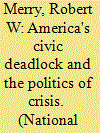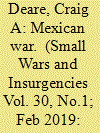| Srl | Item |
| 1 |
ID:
113130


|
|
|
|
|
| Publication |
2012.
|
| Summary/Abstract |
WHEN U.S. lawmakers returned to Washington in December 1849 for the Thirty-First Congress, they knew they faced a raucous session. As Washington's Democratic newspaper, the Daily Union, editorialized, "A crisis in our affairs is rapidly approaching, and great events are near at hand." But the members could not foresee the magnitude of legislative dysfunction. The crisis emerged when the House couldn't muster a majority to elect a Speaker. Without a Speaker, the chamber couldn't organize, and committees couldn't meet. Without a functioning House, the Senate couldn't do business either. President Zachary Taylor couldn't send up his annual message and set a national agenda. Congress couldn't appropriate money. The government froze.
|
|
|
|
|
|
|
|
|
|
|
|
|
|
|
|
| 2 |
ID:
165182


|
|
|
|
|
| Summary/Abstract |
Mexico’s defeat in the war that (in the U.S.) takes the country’s name resulted as much from the strategic context created by unrealized nation-building that followed independence as it did from American tactical supremacy. Three centuries of Spanish empire did not translate into national military excellence due to the decades of revolutionary upheaval that followed the sudden decapitation occasioned by Napoleon’s ouster of the monarchy in Madrid. That the occupation which followed major combat provided salutary lessons learned in dealing with guerrillas rather than a Vietnam-like litany of quagmire eventuated from the conscious designs of military leadership steeped in the same Napoleonic dynamic that had produced our opponent. The United States wisely chose to leave issues of state-building and governance to the Mexicans themselves, while annexing the sparsely populated northern remnant of Spanish empire.
|
|
|
|
|
|
|
|
|
|
|
|
|
|
|
|
| 3 |
ID:
139109


|
|
|
|
|
| Summary/Abstract |
This essay explores how federalized Texas Rangers, in the form of scout companies and larger mounted rifle regiments, provided controversial, and ultimately cost-effective, versatility to the US Army during its campaign in Northern Mexico between 1846 and 1848. It argues that their contributions centered on three tactical tasks that enhanced the invading army's maneuvers: reconnaissance, direct assault, and counterguerrilla patrolling. Each of these actions reflected a distinctive skill-set at which the auxiliaries excelled, marking them as exceptionally multifunctional assets. The Texans' augmentation coincided with, and was necessitated by, the evolving stages of the war in Northern Mexico, beginning with the American army's initial invasion, then transitioning to the assault on Monterrey, and finally ending with a troubled occupation where the rangers' brutality both enabled and undermined American pacification efforts.
|
|
|
|
|
|
|
|
|
|
|
|
|
|
|
|